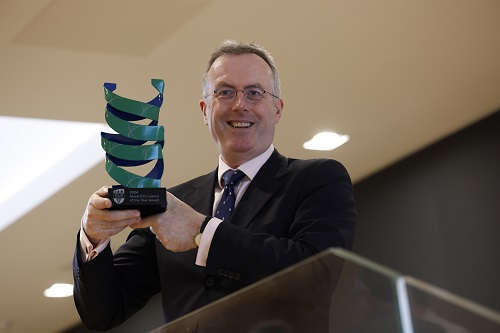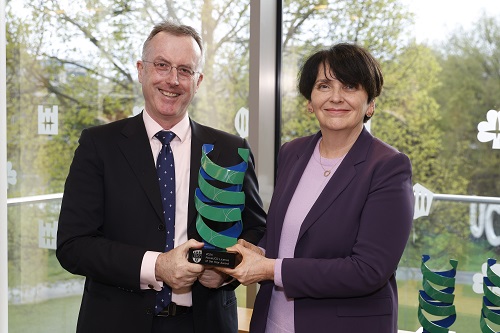
Electric Vehicle Charging Start-Up Receives 2024 NovaUCD Licence of the Year Award
Go Eve, an electric vehicle (EV) charging start-up and a joint University College Dublin (UCD) and Imperial College London (Imperial) spin-out has been named the recipient of the 2024 NovaUCD Licence of the Year Award.
Go Eve was presented with the Award by Professor Orla Feely, President, University College Dublin (UCD) during the annual presentation of the NovaUCD Innovation Awards which took place at the UCD University Club.
Professor Orla Feely, President, UCD said, “The NovaUCD Innovation Awards have become a key annual event highlighting the University’s commitment to innovation and recognise the achievements of our research, innovation and entrepreneurial communities and I congratulate all who have received this year’s Awards. I would also like to wish the Awardees future success as they continue to work towards delivering economic and societal impact in Ireland, and further afield, through their commercialisation, consultancy, entrepreneurial and innovation activities.”

Hugh Sheehy, CEO and co-founder Go Eve and Professor Orla Feely, President, UCD
Go Eve is commercialising the ‘DockChain’ technology. DockChain was originally invented by a team of academics and researchers led by Professor Robert Shorten at the UCD School of Electrical and Electronic Engineering. Professor Shorten subsequently moved to the Dyson School of Design Engineering at Imperial and the technology has been further advanced both at UCD and at Imperial, with additional contributions by the commercial team.
Current EV charging technology only allows for one or two EVs to access a charger at a time, so you need lots of chargers or can only electrify a few parking spaces. The DockChain technology solves this problem by extending the reach of a single EV charger with an extensible daisy-chain of low-cost charging terminals, or ‘Docks’, allowing it to electrify multiple parking spaces.
In its lightweight domestic AC version, DockChain allows several EVs to charge off one household charger, so no need to ever swap cars over in the middle of the night.
DockChain’s high-power DC variant transforms EV charging in fleet depots or most destination locations, hotel, apartment, or office carparks, train stations or even at highway charging locations.
DockChain brings the low cost per space of AC charging, and the speed of DC fast charging.
Software developed by Go Eve manages a virtual queue, flowing power to each individual connected EV, scheduling each in turn. In a fleet context this gives high power DC charging in every parking space, and the ability to charge any vehicle at high speed, in any parking space, at any time. Every vehicle can charge in its own parking space and any vehicle can be charged in minutes rather than in hours, as needed.
Go Eve was co-founded in 2021 by Hugh Sheehy, John Goodbody, Professor Robert Shorten, Dr Pietro Ferraro and Andrew Cullen and the patented DockChain technology was subsequently licenced to Go Eve by UCD in 2022 to enable the company to commercalise the technology.
On receiving the 2024 NovaUCD Licence of the Year Award, Hugh Sheehy, CEO and co-founder, Go Eve, said, “DockChain has the potential to revolutionise EV charging in many locations, from fleet depots to outside the normal home. It can help accelerate the EV transition and help protect our climate.
The technology originated in research here at UCD and represents a great example of how academic research can become an important commercial and environmental innovation. The ongoing involvement and support of both UCD, through NovaUCD, and Imperial College London is critical in the successful expansion Go Eve around the world.”
Having licenced the technology Go Eve closed a £3 million (€3.5 million) funding round in 2023 from a number of international investors, including the Pearl Family Office; Carter Gem; Automotive Ventures Inc.; Kero Development Partners and Cur8 Capital.
The company has also grown to a team of 12 staff, established its headquarters at NovaUCD, with offices in London, and has opened a US office in Ohio, with the US being a key target market for the company.
Successful pilot deployments of the Go Eve technology have also taken place in the UK and Ireland and initial production units have been assembled by manufacturing partners in the UK, with US certification underway.
Sheehy added, “Go Eve is looking at its first installations in the US in the coming months, with manufacturing starting in the US during 2024. We also have multiple sites identified in the UK and European expansion is also expected during this year. Go Eve will also look to investors for additional expansion funding in late 2024, so that the global scale of the opportunity can be pursued.”
The annual NovaUCD Innovation Awards highlight successes made in areas of knowledge transfer, consultancy, entrepreneurship and the promotion of an innovation culture, by members of the UCD research, innovation and entrepreneurial community.
A total of 7 Awards were presented by Professor Orla Feely, UCD President. The other Awardees are;
2024 NovaUCD Innovation Award: Professor Therese Kinsella, CEO and founder, ATXA Therapeutics
2024 NovaUCD Invention of the Year Award: Associate Professor Nan Zhang, UCD School of Mechanical and Materials Engineering
2024 NovaUCD Spin-out of the Year Award: EpiCapture
2024 NovaUCD Consultancy of the Year Award: Professor Fiona Timmins, UCD School of School of Nursing, Midwifery and Health Systems
2024 NovaUCD Founder of the Year Award: John Byrne, CEO and Founder, Corlytics
2024 NovaUCD Innovation Champion of the Year Award: Professor Nick Holden, UCD School of Biosystems and Food Engineering.
ENDS
12 April 2024
For more information contact Micéal Whelan, Communications and Media Relations Manager, NovaUCD, UCD Research and Innovation, e: miceal.whelan@ucd.ie.
